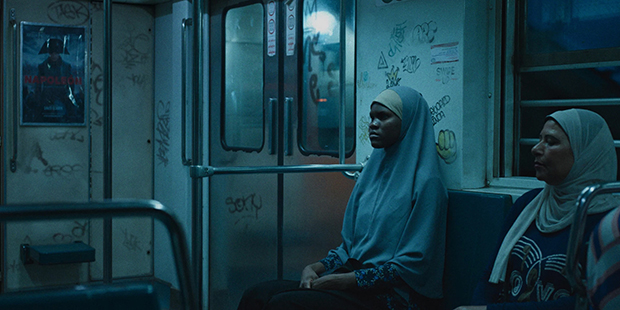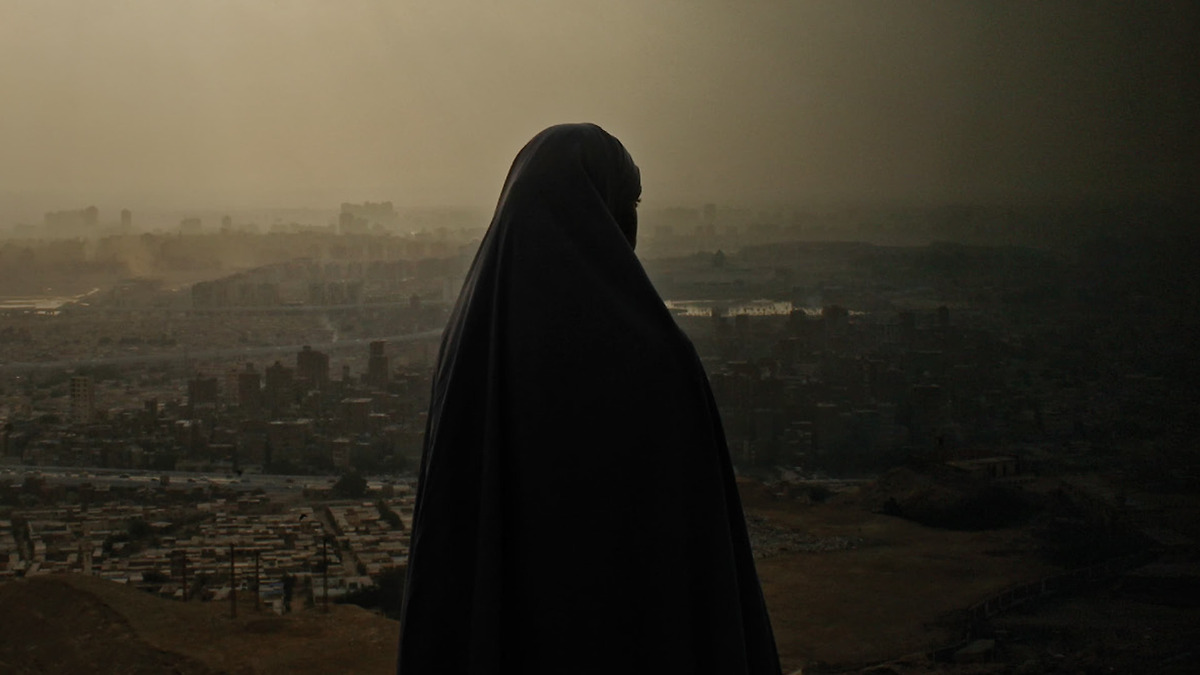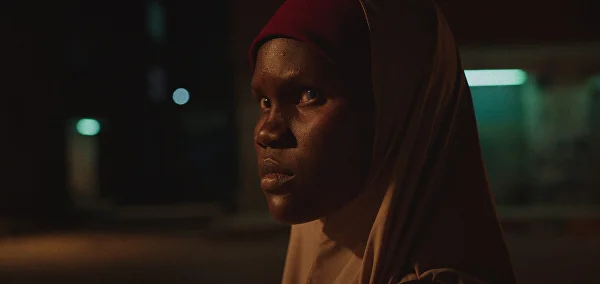Three phenomena continue to grow on a global scale: war and narco-criminal violence, the increasing longevity of human beings, and the forced migration of people for unwanted reasons. Around these three axes—and several others—filmmaker Morad Mostafa builds his fiction Aisha Can’t Fly Away, and with it, the fiction of Aisha herself. This twenty-six-year-old Sudanese caregiver lives in an apartment run by a gangster in the heart of Cairo (Ain-Shams), maintains an ambiguous and unfathomable relationship with a cook, works looking after elderly people in conditions of extreme precariousness, and, from time to time, acts as a nurse and vaccinates a disabled and ill child.
Aisha Can’t Fly Away, winner of the Golden Palm at the Mostra de Valencia —a prize that may lead to its distribution in Spain— is a dark, complex, and faithfully narrated film. The feature, a little over two hours long, offers an equidistant reading of contemporary capitalism. This is conveyed through the narrative forms that acquire sensitivity within the piece. According to Mexican philosopher Sayak Valencia, gore capitalism arises in contexts of deregulated labor markets, deterritorialization, and the decodification of financial flows; it is this current stage of capital that also gives rise to films that recreate bloody and cannibalistic scenes, producing a kind of real blow to reality, an unsettling sordidness that becomes a visual trauma for viewers.

Aisha Can’t Fly Away is what happens when a filmmaker becomes deeply involved and attempts to narrate—and in some way sublimate—the most complex realities of the contemporary world. In Sudan today, there are thousands of displaced people and countless deaths, United Nations reports left unanswered, and a genocide disguised as a supposed civil war that has already lasted more than three years. Thousands upon thousands flee their homeland, a reality the international media barely addresses, with more than five hundred thousand people displaced so far in 2025. The film, produced by Sawsan Yusuf, denounces the idea that escaping war is a mental state: it means being trapped in the impossibility of returning, in missing those who remain behind, in imagining every day the worst possible scenario.
Shot in Egypt, the film reveals the nuances of otherness and reminds Western Judeo-Christian audiences that Africa is not a single country but a vast continent where no peaceful resolution is in sight, where some nations endure genocides worse than those of the 20th century, like the one taking place in Sudan. This crisis, rooted in events dating back to 1989, has already forced more than fourteen million people from their homes. Within the international, regional, and domestic layers of the conflict, Sudan stands as Africa’s third-largest gold producer, while 92% of its population lives below the poverty line.
And yet, despite being labelled by certain Spanish critics as trauma porn or misery porn, Aisha Can’t Fly Away is not a fetishistic film—perhaps because what is really at play is the gaze of those who judge and classify it, rather than the film’s formal procedures in cinematography and mise-en-scène. Throughout the film, neither the narrative nor its treatment remains anchored in the emotional shock of its most harrowing scenes. Instead, it pursues deeper approaches, and through a vertiginous blend of landscape and action, it reveals how the system takes both victims and perpetrators hostage, placing them all in a state of perpetual paranoid suspicion in which moral boundaries—and the very notion of life—seem suspended.

Aisha, the main character, falls under exploitation networks so complex that she herself ends up becoming part of the very same machinery—above all, a machinery of patriarchal oppression, not because of any genital condition but because of the way that oppression is exercised, where anyone showing the slightest sign of weakness becomes the next cannon fodder for the system that devours everything. That weakness may take the form of a migrant woman, an elderly man, or a member of a narcocriminal group. All of them are perpetrators and not at the same time; that is the eternal African contradiction, because if you were born in a country like Sudan, you are condemned to be a foreigner everywhere, even in the place where you were born.
Aisha Can’t Fly Away, which stood out in the Un Certain Regard section at the Cannes Film Festival, also questions the economy of care—the one in which work is badly paid and carried out under the worst conditions, a safety net without which the world would collapse for good. It is an ethical dimension that cannot be stated but is enacted, cultivating goodness in the shadows. Because the only moments in which the protagonist regains her dignity, her place in the world, her humanitarian sense, are those in which she cares for others—and also when she is cared for by others—without any purpose beyond care itself: in her complex relationship with a group of women living in a kind of ghetto; and also when the gangster himself takes her around the city on his motorcycle in search of the man who abandoned her. Perhaps Aisha’s journey allows us, as the essay Philosophy of Care by philosopher Boris Groys suggests, to seek traces of the protagonists of care in a world where states abandon and the market leaves people unprotected.

There is a metaphor that runs throughout Aisha Can’t Fly Away, one that turns Aisha into an ostrich—and that ostrich takes on the shape of an archetype. This is why, when the film’s credits roll, a series of questions inevitably arises: What is an ostrich? A bird that cannot fly? A creature that appears harmless but is, in fact, highly dangerous? The speed of these times? The goddess Maat—truth, justice, harmony, order? The feather from the heart of Osiris? The real, ancient Egyptian animal? Wealth, eggs, Africa? The representation of a woman who longs to be something else but cannot? Someone who wants to fly yet is condemned to run? The ontology of the bodies of those who care for others in this era of caregiving? The face of injustice in the twenty-first century?








No one has posted any comments yet. Be the first person!